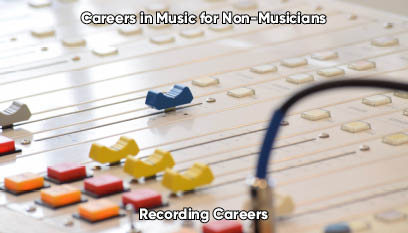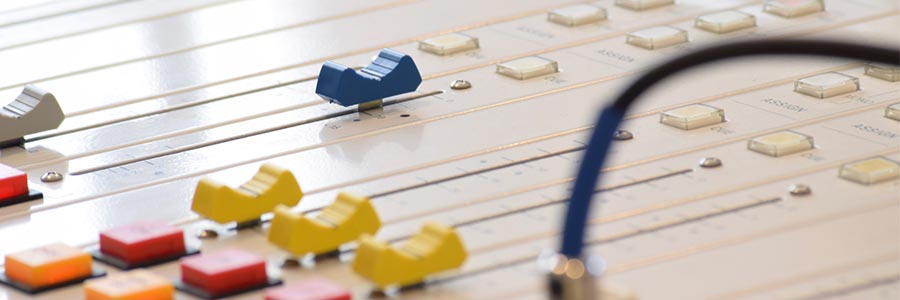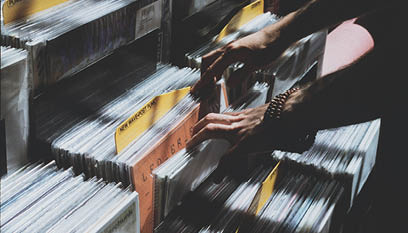(This is Part 1 of a four-part series, Careers in Music That Do Not Involve Performing.)
For my day job I work in student activities at a public university in New England. I do a lot of the traditional things associated with this job, like advising student organizations and putting on leadership programs. But for several years, before life got too busy, I was also able to bring in a bit of my music world into my day job by running a program called Music Mentors.
The premise of Music Mentors was very simple. Over the years I had seen some student bands do better than others because they were able to make one-on-one connections with more established professionals and gain from their experience. So the program aimed to help more students establish those connections.
For each session I’d bring in a variety of folks to talk about what they do in the music world. We’d briefly share some background info on the panelists and then we’d ask the students what they were interested in. That way I knew how to moderate the conversation to make sure the students learned about what they wanted to learn about. About ⅔ of the way through, I would end the formal discussion and encourage students to talk one-on-one with the guests.
This program led to the creation of a few bands, but more importantly it led students into internships and jobs in the local scene.
So in the spirit of Music Mentors, I have prepared a four-part series about Careers in Music That Do Not Involve Performing.
- Recording Industry
- Concerts & Venues
- Radio, Art & Journalism
- Gear & Lessons
For this post, I spoke with professionals in the recording industry.
RECORDING ENGINEER
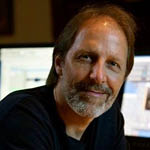
Courtesy Photo
Christopher Magruder
Producer / Engineer at Thundering Sky Recording
South Berwick, Maine
Magruder has been working professionally as a recording engineer and producer in Seacoast New Hampshire and southern Maine since 1991. He opened Thundering Sky Studios in South Berwick, Maine in his 100-year-old barn in the late 1990’s. He has recorded hundreds of artists and bands in all styles, as well as recording and editing audiobooks for major publishers and other spoken word projects. He feels very fortunate to have worked with so many highly creative songwriters, and amazingly talented musicians while living in a beautiful part of the country.
SGT: What job(s) do you have (or have you done) in the world of music?
Magruder: My roles in the studio are recording engineer, editor, producer, and mixing engineer. Engineering is about capturing and crafting sounds that are compelling and support the emotion and energy the artist is trying to convey. As a producer my job is to ensure that all elements of a recording are working to pull in the listener, hold their attention, and connect them to the energy, emotion, and meaning of the song or piece of music, and capturing the personality of the artist. This includes suggesting changes to parts musicians are playing when needed and coaxing the best possible performances out of everyone. I’m also responsible for managing the vibe or energy in the studio, making sure it is positive and relaxed. As a mix engineer my job is to understand the intent of the artist and producer and create a soundscape the enhances that intention and pulls the listener into the “world” that the song or piece of music inhabits.
SGT: How did you get started in this type of work?
Magruder: I guess what really started me on this path was listening… I grew listening to the rock, pop, funk, blues, folk, and bluegrass of the late 60’s onward. This was the beginning of an amazing period of creativity and technological advancement in creating and recording music. I would spend hours listening to albums and tapes in my bedroom and in the car, and it was transformational for me. I began singing and playing guitar, and pretty quickly started writing songs as well. I started recording myself on a portable cassette player, then entered my first recording studio in Atlanta when I was in college. I fell in love with the studio environment and the creative possibilities it held, and shortly afterward bought my first 4-track tape recorder and began recording myself and the bands I played in. As better home recording equipment came out I kept upgrading my gear, and eventually started recording other musicians as well. I moved into the Seacoast in 1991 specifically looking for a studio to apprentice myself to. It was a fantastic time for local music in the area, and I started at Dizzyland Recording, where I worked with many amazing bands and artists under the mentorship of the amazing Hank Decken. I became the head engineer there and over several years we became the top studio in the area. I opened my own studio, Thundering Sky, in the late 90’s, where I am today.
SGT: Do you have any suggestions on how someone who is interested in your type of work can get started and gain practical experience?
Magruder: My advice for anyone who wants to get into this business is to buy some recording software, an audio interface, and some mics and begin recording yourself and whoever else you can. You usually begin by trying to create recordings that sound like the records you’re listening to in that style, but you may stumble on some unique and interesting sounds and techniques in the process. There are hundreds of YouTube videos demonstrating different recording and production techniques out there, so check those out. But it’s most important to just practice and do the best you can with whatever gear you have. I’m still learning every week.
SGT: What are some of the most common misconceptions about what someone in your line of work does?
Magruder: I guess the biggest misconception about what I do is that the final master is just what the band sounded like in the room when they came in. Depending on the style of music more or less manipulation is involved, but almost all sonic and performance elements are being crafted and massaged. I tend toward more natural-sounding recordings (unless the project is more pop or electronic stylistically), but I’m still doing hours of work getting the tones, balance of elements, and ambiance/effects just right to hold the listener in that magical space the artist is trying to create.
SGT: Do you work on any non-music recording projects?
Magruder: Yes. I also record spoken word in many forms including poetry, audiobooks, and voice-over for commercial use.
OWNER OF A RECORDING STUDIO
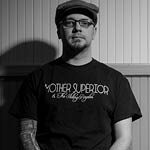 Christopher Chase
Christopher Chase
Owner / Operator / Chief Engineer at The Noise Floor LLC
Dover, New Hampshire
Chase is the owner, operator and chief engineer at The Noise Floor LLC, in Dover NH. The Noise Floor is a large format, dual studio complex, specializing in hi-fidelity recordings of all kinds. He has been a professional audio engineer and record producer for the last 13 years. Chase is enthused daily by music and the magic that it can offer to both the listener and the creator, equally.
SGT: What job(s) do you have (or have you done) in the world of music?
Chase: Audio engineering, including live sound reinforcement, studio recording and location recording for TV/ film. As a music producer for the last 13 years, I have very rarely added anything to a client’s work that I personally played. This is less than 3-5% of my total work over that time.
SGT: How did you get started in this type of work?
Chase: I was playing saxophone in several local groups during 2001-2003 and had several experiences in different recording studios/ scenarios during that time. I grew very interested in the world of engineering and producing. Shaping sounds and songs was very interesting to me. After poking around doing some home recordings and learning, the hard way, I decided to attend a two-year college, specifically for audio engineering. I had no idea that this school and the real life experience during those two years would open the doors for my career over these last 13 years.
SGT: What are the important skills for someone interested in your type of work to cultivate?
Chase: Attention to detail and patience are the biggest factors in my daily workflow. Sometimes they mix evenly, other days require a lot more of one or the other. There are a lot of very tangible factors within this field, and just as many intangible ones. You need to know your gear, from microphones and cables to outboard equipment and modern Digital Audio Workstation workflows. Every studio is different, every engineer works differently, and every client is as unique as can be. Audio engineering is and can be very complex. It requires organization and creativity. I find it to be a good balance of both left and right brain functionality.
SGT: Do you have any suggestions on how someone who is interested in your type of work can get started and gain practical experience?
Chase: Real life experience has always worked the best for me. Buy some equipment or software, get on YouTube and watch how other people problem-solve or get creative with their craft. Succeed and fail, and understand the value to assign to both experiences. If you want to take it a step further, look into a college major that will prepare you for the media industry or seek an internship or job at a company that employs audio engineers. Internships can be hard to find in this field, admittedly. I myself struggled to have that experience, until I attended my two years of school. I had to prove myself just to get a foot in the door for an internship, but if you’re thirsty enough, you’ll get in somewhere.
SGT: What are some of the most common misconceptions about what someone in your line of work does?
Chase: Hmmmmm. I don’t make beats. I don’t auto-tune bedroom rappers. I don’t play every instrument on Planet Earth, quite the contrary. These are the obvious ones to me, having been asked them for the last 12-13 years. I don’t know where to get you coke, either.
SGT: What kind of other “non-music-playing” professionals do you regularly work with?
Chase: I record voice-over work for marketing agencies. We work on regional and national radio/ television and internet ad campaigns. I’ve recorded commercials for ESPN, Lexus, Bank of America, Portsmouth Hospital, Red Bull, etc. I have also done 5-6 books on tape in the last several years. This is typically just a single voice actor recording without the addition of any music. I have done some sound design for short films and web series. This is typically called Foley and ADR. Creating or sampling background noises within scenes. Feet shuffling, silverware, voices, cars, explosions, etc. I have also done a fair amount of consulting over the last 7-8 years. This could be helping a client or fellow engineer set up a new recording room or rig. Sometimes this is a business or private individual looking to acoustically treat a home or office. I have helped several local venues acoustically treat their facilities as well.
SGT: Do you have anything else to add?
Chase: Within the field of audio engineering there are many paths one can take. I have chosen a very specific facet of the industry to focus on and carve a career out of. I am a self-made record producer, which is essentially the only way to become a record producer. I have chased that dream, and it has thus far lead me to building, owning, and operating two different businesses and facilities. My job is not simply off the shelf, and it isn’t available to anyone by simply filling out an application. I am one of several thousand independent record producers in this country, and we all had to chase the dream for ourselves and build up our own clientele, business, and reputation. We represent just a small sliver of the the work opportunities available within the world of audio engineering/ professional audio today. Technology has opened up a whole new chapter for audio engineering, with voice automation software being implicated everywhere. There are still a lot of technical jobs on TV shows, films, local cable, radio, internet and streaming platforms, systems installation, etc. I chose to focus on specifically the recording arts and I don’t see that changing anytime soon.
CEO OF A RECORD COMPANY
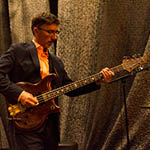 Bob Lord
Bob Lord
Producer / CEO at PARMA Recordings
North Hampton, New Hampshire
Bob Lord is a producer, composer, bassist, and CEO of PARMA Recordings. In 1996 he co-founded the award-winning trio Dreadnaught and since 2005 has been the Music Director for the New Hampshire Public Radio series “Writers on a New England Stage” at The Music Hall in Portsmouth, NH. Bob was named one of Musical America’s “30 Professionals of the Year: Key Influencers” in 2015.
SGT: What job(s) do you have (or have you done) in the world of music?
Lord: Actually… just about all of ‘em. Building and operating my company, PARMA Recordings, has required me to have hands-on experience across a wide spectrum of responsibilities, and knowing how all these actually function – creating, producing, managing, marketing, distributing, publishing, licensing, you name it, all a daily part of my life but having nothing to do with playing the bass guitar that is my instrument – has allowed the company to achieve more for our artists, more for ourselves, and more for the musical community. Many people want to avoid the non-artistic aspects of a life in music, but I think it is vital to embrace them, to understand them, and to utilize them.
SGT: How did you get started in this type of work?
Lord: I got my start like so many other kids of my 70s/80s/90s generation – playing in bands with my friends, making a racket. Looking back, I think that beginning to perform in public quickly was an important step. I had only been playing bass for about one year when I had my first gig, and it rapidly became clear that there was a massive amount of work that needed to be done beyond making the music simply so we could make the music.
SGT: What are the important skills for someone interested in your type of work to cultivate?
Lord: Clarity of communication, attention to detail, depth of analysis, speed of thinking, and playing well with others are all necessary-for-any-job skills to develop and practice every day. That’s the foundation, but in my opinion it is crucial to keep a sense of humor, a sense of fun when doing this – if I’m not laughing, if I’m not energized, then I’m not being creative and open to new ideas and new experiences. I’m in the fun zone as frequently as is humanly possible. Playing in a band like Dreadnaught for over two decades will do that to you.
SGT: Do you have any suggestions on how someone who is interested in your type of work can get started and gain practical experience?
Lord: There is no substitute for being in the field, whether it is in a studio watching a session, or helping the crew of a theater, or working for a street team, or simply performing a concert. Get out there, make some friends, get some experience, figure out what you like and what you don’t – and then do it again, and again, and again. Rinse, wash, repeat.
SGT: What are some of the most common misconceptions about what someone in your line of work does?
Lord: Many people who are not in the industry are surprised that an artist and a businessman can exist in the same body, in the same mind, at the same time, and not cause some kind of cataclysmic cosmic annihilation. That’s why if you can acquire these skills, and be someone who is fluent in the language of music and the language of business, then you’ve got a leg up.
SGT: What kind of other “non-music-playing” professionals do you regularly work with?
Lord: Many, many professionals in this field do not play music, or are not musicians – a much larger number than one might guess. Just because you don’t play an instrument or sing or paint or sculpt or whatever has no bearing on anything. Passion and dedication will always carry the day.
STUDIO MUSICIAN AND COMPOSER
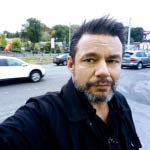
Courtesy Photo
Duncan Watt
Producer / Engineer at FastestManInTheWorld Media
Podcaster at The Muse Podcast
Greater Boston Area
Duncan Watt’s career includes work in television, film, broadcasting and digital games. A seasoned studio musician, producer, sideman, and composer, Watt’s work appears in a wide variety of projects, including the internationally-acclaimed Bioshock Infinite (Irrational/Take-Two), the wildly-successful League Of Legends (Riot/Tencent), Need For Speed Undercover (EA/Black Box), summer blockbuster Now You See Me (Lionsgate), and many others. He is the co-host of The Muse Podcast, and plays with a variety of local bands.
SGT: What job(s) do you have (or have you done) in the world of music?
Watt: I record/produce musicians, and I produce a podcast about where music comes from.
SGT: How did you get started in this type of work?
Watt: I began recording myself as a young musician, then started recording other musicians on the side, which led to a professional engineering/producing gig. I began recording the podcast a few years ago, and it kind of took off itself.
SGT: What are the important skills for someone interested in your type of work to cultivate?
Watt: Listening to music both objectively and subjectively could be key, and a true love of all aspects of music, from creation to delivery/performance, is pretty important, IMHO.
SGT: Do you have any suggestions on how someone who is interested in your type of work can get started and gain practical experience
Watt: I’m an old-school “do-it-yourselfer.’ I say just get going, start doing what you love. If you spend enough time at it, everything comes together after a while. But just get going.
SGT: What are some of the most common misconceptions about what someone in your line of work does?
Watt: Many people don’t understand how much work goes into pretty much anything in the art/entertainment/creation business. It’s not a ‘go to work at 9 AM, get out at 5 PM’ process. While it’s a total privilege to make shit for a living, it’s all-consuming. In a good way, but still all-consuming.
Don’t forget to check out the other posts in this series!
Careers in Music That Do Not Involve Performing:

